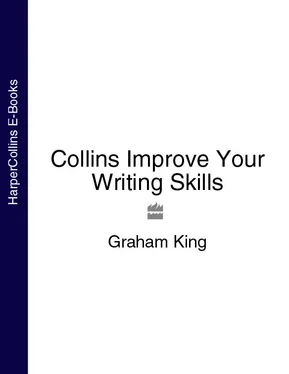Let us briefly mop our brows and try to fathom what the poor, befuddled author intended to say, before we set about helping him say it in plain English.
At a guess, the passage could be summed up like this:
I refer to your request for a bus shelter in Ligett Lane . . . Unfortunately, because of Government spending cuts, West Yorkshire Metropolitan County Council has in turn ordered a curb on bus-shelter building. Although there may be more money for such work in our next financial year, shelters already on the waiting list will obviously be built first.
This seems simple enough, so where did the author go wrong? Let us lay his Frankenstein’s monster on the dissecting slab:
I refer to your recent letter in which you submit a request for the provision of a bus passenger shelter in Ligett Lane . . . If the writer identifies the subject clearly enough, there is no need to remind his correspondent of all the details. The correspondent wants a straightforward Yes, No, or even Maybe – with an explanation, if the answer is No or Maybe.
The stated requirement for a shelter at this location has been noted . . . Of course it has. Otherwise the official would not be writing at all.
but as you may be aware . . . This is word-wasting. It doesn’t matter if the correspondent is aware or not. The official’s job is to make sure the correspondent knows the facts now.
shelter erection at all locations within West Yorkshire has been constrained in recent times . . . No purpose is served by at all locations. There is no reason to use within rather than in, no matter how widely this particular verbal fungus has spread.
constrained should be replaced by the easier-to-understand restricted ; and in recent times is a redundancy. So is as a result of instructions issued by.
West Yorkshire Metropolitan County Council is rendered with a rare and forceful clarity, with not a syllable wasted. But then we slide back . . . in the light of the Government’s cuts in public expenditure . . . The only meaning of in the light of, here, is because of. Your reader, rightly or not, will still blame the Government for the lack of a bus shelter, whether you use the clear or the foggy expression. So why head into the fog? (See Fog Index, page 75)
and, although it seems likely that the Capital Budget for shelter provision will be enhanced in the forthcoming Financial Year . . . The reader is less interested in what the bus shelter fund is called than what it will do for him, and when. So ditch the Capital Budget. And since a shelter is a shelter, provision is yet another unneeded word.
enhanced, in this context, means increased ; there seems to be no reason to evade the more commonly-used word.
it is axiomatic that . . . Your dictionary will tell you that an axiom is a self-evident statement, a universally accepted principle established by experience; axiomatic here is presumably meant to convey self-evidently true. If something is that obvious, the official is wasting paper and his correspondent’s time in saying it.
residual requests in respect of prospective shelter sites identified as having priority, notably those named in earlier programmes of shelter erection . . . Thrusting the dissecting knife into the middle of this lot, we are left with shelter requests not met by earlier building programmes to which we add will take precedence in any future shelter programme. There’s not a lot to argue about here, for once – apart, perhaps, from the repetition of shelter programme.
The deskbound, wordbound Frankenstein who created our monster may be saddened, even angry, at the way we have slimmed down his offspring. But at least he – and more importantly, his correspondent – can now discover what he really meant to say.
Missives such as our bus shelter letter don’t have to be long to lose their way. Here’s a paragraph from an insurance policy, hunted down by the Plain English Campaign:
The due observance and fulfillment of the terms so far as they relate to anything to be done or complied with by the Insured and the truth of the statements and answers in the Proposal shall be conditions precendent to any liability of the Company to make any payment under this Policy.
Follow? Perhaps after five minute’s concentration you might feel that you have fully understood it. The Campaign’s recommended version would no doubt leave the insurance company gasping for words:
We will only make a payment under this policy if :
you have kept to the terms of the policy; and
the statements and answers in your Proposal are true.
Almost all officialese can be analysed, dissected and rendered into clear and readily understood English but some is so dense as to resist the sharpest and most probing of scalpel blades. Here’s an example, quoted by the Daily Telegraph, that consigns itself forever in the limbo of lost understanding:
ANY lump sum paid in accordance with Provision 7 of the Second Schedule shall be an amount equal to the Basic Nominal Fund that would be applied to calculate the Alternative Annuity under Provision 5 or Provision 12 of the Second Schedule on the assumption that the Annuitant had elected under Provision 4 of the Second Schedule that the date of his death was the Alternative Vesting Date or if greater an amount equal to the premiums received by the Society.
This is the sort of verbal hurdle that is still likely to confront average citizens at any time. Are we really expected to understand this guff? Or are we expected to hire a specialist or consultant to help us? Yet none of the sorry examples quoted here need have happened, if only the writers had held this conversation with themselves:
| Q |
What’s it all about? |
| A |
It’s about when somebody is classed as disabled/the special duty of a landlord in a Housing Action Area/someone wanting a bus shelter built. |
| Q |
What do we want to say? |
| A |
We want to say that someone who can’t walk unaided is officially disabled; that a Housing Action Area landlord has to warn the council when there’s about to be a tenancy available; that we can’t afford the requested bus shelter just now. |
| Q |
Very well. So why don’t we just SAY it! |
There is no excuse for obscurity. The English language, with its lexicon of nearly half a million words, is there to help any writer express any thought that comes into his or her head – even the virtually inexpressible. If we can’t manage this, we should give up and leave it to others. Or admit our faults and learn how to do better.
The No-Good, the Bad and the Ugly: the Obstacles to Clear Communication
The long, long trail a-winding: Circumlocution
Bournemouth was on Monday night thrown into a state of most unusual gloom and sorrow by the sad news that the Rev A M Bennett – who for the last 34 years has had charge of St Peter’s Church and parish, and who has exercised so wonderful an influence in the district – had breathed his last, and that the voice which only about a week previously had been listened to by a huge congregation at St Peter’s was now hushed in the stillness of death . . .
Lymington Chronicle, January 22, 1880
When a writer or speaker fills you with the urge to shout ‘Get on with it!’, he or she is probably committing the sin of circumlocution– roundabout speech or writing, or using a lot of words when a few will do. In most of today’s newspapers the prose above would be a collector’s item.
Читать дальше












